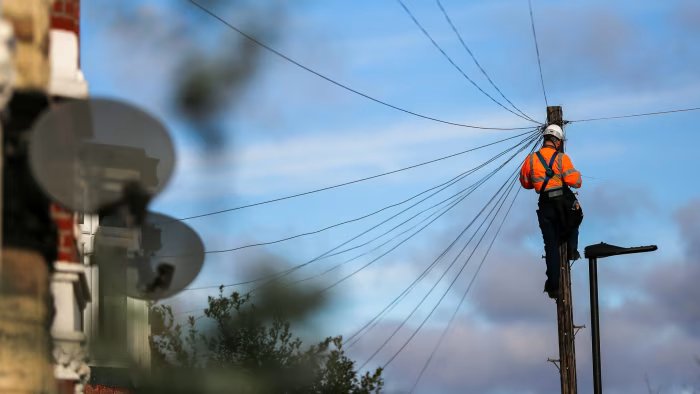Unlock the Editor’s Digest for free
Roula Khalaf, Editor of the FT, selects her favourite stories in this weekly newsletter.
BT’s Openreach has threatened to scrap the final leg of its goal to make full fibre available to 30mn homes by 2030, escalating a dispute with the communications regulator over price curbs on the UK’s biggest broadband provider.
Openreach, the broadband infrastructure company owned by the former telecommunications monopoly, is on track to increase its coverage from 20mn to 25mn homes by 2026, and is then due to grow that to 30mn.
But Clive Selley, the company’s chief executive, said the business case for covering the additional 5mn homes would be undermined by Ofcom’s draft proposal for the next five-year regulatory period, which would retain restrictions such as price controls to limit Openreach’s dominance.
“I’m going to hold fire getting approvals for that final 5mn tranche [of homes] until I see what comes out of the TAR,” Selley told the Financial Times, referring to Ofcom’s Telecoms Access Review — a five year regulatory check-up of the market.
Openreach also hosts customers of other providers such as Sky, TalkTalk and BT’s brand, EE. The company previously said it would struggle to meet its 2030 target if Ofcom maintained measures such as caps on the price it can charge broadband companies to use its network.
“If I can’t see where the regulation is going to land then I can’t articulate the business case [internally] and therefore that business case goes on hold until we see the final wording,” Selley said, indicating a hardening of Openreach’s stance.
“These are worrying times for the UK because, as the only credible builder for the last tranche of homes . . . it’s incumbent on us to keep the programme going,” Selley said.

The warning, which could risk leaving millions of households without access to full-fibre broadband, comes as Ofcom reviews how to regulate the UK broadband market, with the results expected in the spring of next year.
The previous review in 2021, which curbed Openreach in an effort to stimulate competition, led to a wave of new entrants known as alternative network providers, or “altnets”, spending billions of pounds rolling out their own networks.
The scale of the altnets’ rollout — which has seen more than 16mn homes now covered by providers other than Openreach or Virgin Media O2 — previously led Openreach to demand that restrictions be lifted in parts of the country with two or more networks.
But competitors including Virgin Media O2 and CityFibre have argued that Openreach retained significant market power and that restrictions should stay in place.
Ofcom said its “pro-competition, pro-investment regulation” had led to the UK becoming one of the fastest builders of full-fibre broadband in Europe and that it was “consulting extensively on proposals to maintain that momentum”.
BT chief Allison Kirkby warned in September that UK telecoms operators pay 10 times the amount of “government inflicted costs” — such as business rates and energy levies — than peers in comparable European countries.
Selley warned that further tax rises in this month’s Budget would hamper “our ability to invest in critical national infrastructure and a full fibre future for the UK becomes undermined”. He added that 20 per cent of homes in the country were still without full coverage, which was “huge”.
“They [Ofcom and the government] have to create the conditions or maintain the conditions for continued investment,” he said. “I worry that the new regulation in draft form does not do that”.

